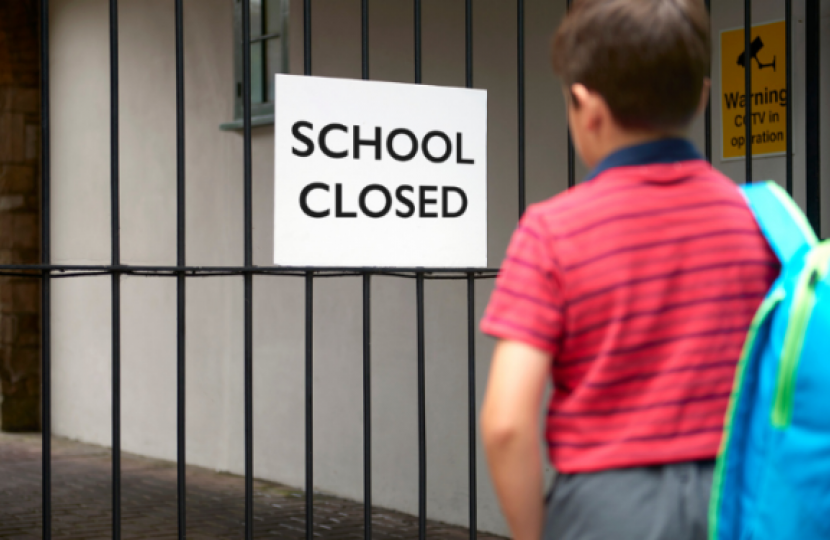
First reported in Conservative Home
Between the start of the pandemic and July 2021, British children were out of the classrooms for almost half of the available school days, wielding a hammer blow to their education and wellbeing.
Educators and school staff made a herculean effort throughout the pandemic to react to evolving circumstances, but as we all know, the classroom is the best place for our children to learn and develop to reach their full potential.
This is why today, I am introducing a new 10 Minute Rule Bill to protect millions of pupils and students from the disaster of future school shutdowns.
The Bill has the backing of Children’s Commissioners past and present, as well as two former Children’s Ministers – Edward Timpson MP and Tim Loughton MP. Dame Rachel de Souza commented, “we must do everything we can to keep children in school and this Bill provides the opportunity to do just that.” Anne Longfield noted, “Never again must schools have to compete with pubs, theme parks and Primark to open…We should be in no doubt that keeping children in educational settings is a priority so I support this Bill.”
I also appreciate the strong support of UsforThem parents group for this Bill alongside all their campaigning to keep schools fully open for all our children over the pandemic.
My Bill seeks to define schools and education settings as “essential infrastructure” alongside other premises such as power stations, hospitals and food retailers which are fundamental to the smooth running of the country, and to our daily lives.
The Bill will also introduce a ‘triple lock’ of protections to safeguard against any future school closures, except in cases of extreme emergency.
The triple lock would require the Government to seek the advice of the Children’s Commissioner on the necessity of closing schools, hold a debate and vote in Parliament to agree the measure, and then seek the further advice of the Children’s Commissioner and a further vote by Parliament every three weeks to place a strict time-limit on any future disruption.
We rightly follow the science and advice from SAGE and the JCVI when it comes to our health, so it is only logical that we must also follow the advice provided by the Children’s Commissioner and those with the best interests of our children at the heart of their mandate.
But let me be clear. I am not a lockdown sceptic – I am a school-down sceptic.
School closures have contributed to a widening attainment gap, a worsening mental health crisis, not to mention numerous safeguarding hazards and diminished life chances.
Even before the pandemic, disadvantaged pupils were already 18 months of learning behind their better-off peers by the time they took their GCSEs. But school closures have turned the attainment gap into a chasm.
Research published by the Education Policy Institute has shown that by March 2021, the average learning loss for primary school pupils in maths and reading were 3.4 and 2.2 months respectively. For disadvantaged pupils, this was even greater, with 4.2 months lost in maths and 2.7 months lost in reading.
Moreover, it is estimated that school closures will cost our young people between £78 and £154 billion in lost earnings over the course of their lifetimes. And these figures represent an optimistic outlook. If we allow ourselves to consider a more pessimistic view, lost earnings could be as much as £463 billion.
Report after report speaks to these harms, but they were not an unfortunate inevitability of an international public health emergency. Our children have missed more than double the amount of school than children in other countries.
Children in Belgium missed just four per cent of their school days. In Sweden, education settings remained physically open to under 16-year-olds throughout the pandemic. In fact, British children have missed more school than any other country in Europe except Italy.
The facts speak for themselves and testify to what we know instinctively as parents and human beings.
A tablet is no substitute for in-person schooling. A laptop cannot replace the enriching and skills-building environment that a school community provides. A screen cannot replace the social interaction and friendships that are the essential building blocks of childhood.
Schools represent the North Star for children’s prospects and life chances. They provide structure, they provide a safe space to support children’s positive mental health and they provide a vital sanctuary for vulnerable children. What could be considered more “essential” than this.
It would be inconceivable to close power stations, hospitals and food retailers during a time of crisis. And rightly so – they are the lifelines to our communities. It is time we treated our schools with the same reverence – both in word, and more importantly, in deed.
We must learn from our experiences over the course of the pandemic to make sure that we prioritise children’s education moving forwards. We owe it to our young people to safeguard the educational futures that Covid-19 put on hold. Anything less would be a dereliction of duty.
